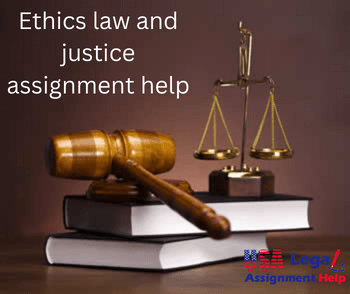Perspective on Ethics, Law, and Justice in the United States
In any modern state, the interaction between law, ethics, and justice is one of the most important. While it is uncommon for any citizen or official to consider this relationship in the abstract, disagreements over this relationship in specific instances can be both common and severe. The most basic relationship between laws, ethics, and justice is that justice is satisfied when laws enforce ethics. According to this model, ethics describe an individual's best behavior in a given situation, the law enshrines that individual's duty to engage in such behavior, and justice is done when the law is enforced and, as a result of this enforcement, the duty is performed by the individual (or, at the very least, protected from interference by others) or, if it is not performed, the individual is punished.
A famous example of this concept is legislation that prohibits homicide. Each person has an ethical commitment not to end the life of another person unless there is a compelling reason to do so, such as self-defence against a threat to one's own life. The law imposes a similar requirement, and one of our most fundamental concepts of fairness is that the state is accountable. Despite the clarity of such a relationship between ethics, law, and justice, this model is insufficient to understand how these many types of responsibility interact. To begin with, it is difficult to establish who does these duties and how they would accomplish them under this paradigm. Who defines an ethical duty, who makes laws that entrench such definitions, and who decides what justice demands and whether it is met?
The model is inextricably linked to who and how these duties can be completed. Most importantly, how far can people like these go? It is one thing to declare that murder is unethical, but why can't the same individuals who decide that murder should be prohibited also decide to punish those who make a profit, refuse to attend a state church, wear a veil in public, or go to school to learn about evolution's biology? All of these citizen actions were deemed unethical and, in some cases, illegal by one or more major legal systems of the twentieth century. The most difficult challenge in linking ethics, law, and justice is not just determining what ethics a person must have in dealing with others. A more pressing topic is how to determine the official's ethical responsibility. This is the most important question to answer what justice requires?
Laws, ethics, and justice all have a relationship in that each is a set of standards or ideas about what we should do. Each norm establishes a separate source of authority or a motive for acting. Comprehending how norms work and their constraints, in general, may aid in understanding the relationship between ethics, laws, and justice.
Norms are views that people have in a community about what individuals should or should not do. Norms include obligations arising from social interaction, such as manners; obligations arising from custom and reason, such as ethics and morals; obligations arising as a result of institutional acts by the state, such as laws; obligations arising from commercial relationships, such as trade customs; and obligations arising from more private habits, such as family traditions or sporting rules. There are a nearly endless number of sources of rules that would control a nearly infinite range of human actions. Ethics, laws, and justice are all collections of norms. Laws are unique in that they must emerge from within state institutions and be implemented by authorities; nonetheless, both laws and ethics are standards that operate to generate requirements for individual behavior.
Get the best Ethics, Law, and Justice Assignment help at an affordable price
Ethics, law, and justice are three interconnected concepts that are necessary not only for academic study but also for practical implementation in everyday life. Ethics law and justice assignment essay help is essential for all students, but it is especially crucial for legal students who require ethics law and justice assignment dissertation help. They are critical areas of law assignment help for legal students. On the other hand, they are equally applicable to the general public. As an example, consider the application of medical law and ethics in real life. Although the principles of ethics law homework help are interconnected, there are small distinctions. Usalegalassignmenthelp.com attempts to decipher the numerous threads of ethics law and justice assignment essay help. You can also contact us for law assignment help in all your law subjects.


 Login
Login